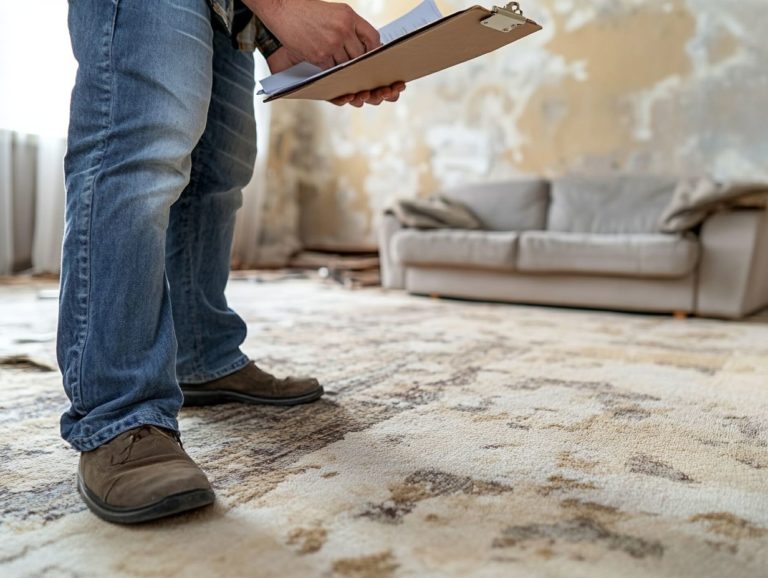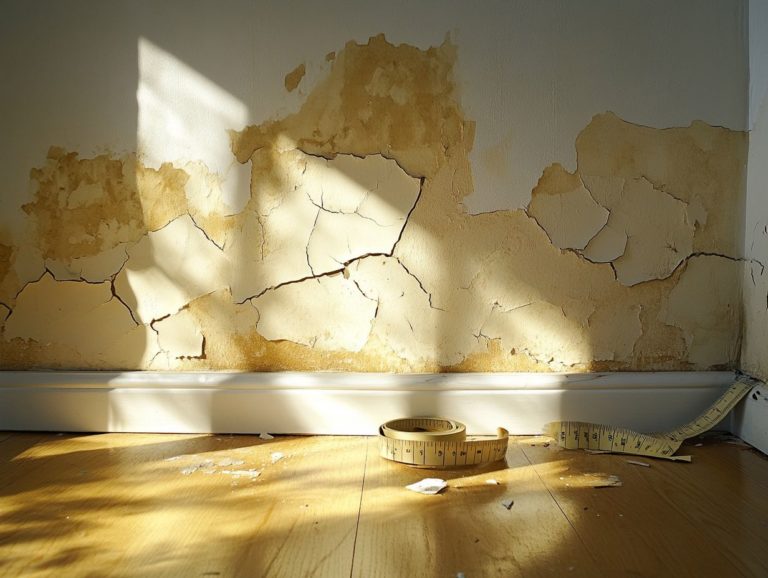Can I Insure My Home with an Existing Mortgage?
Homeowners insurance is an essential shield for property owners, offering peace of mind and financial protection against unforeseen events.
This guide delves into what homeowners insurance encompasses and its importance. It also outlines specific requirements for those with an existing mortgage. Additionally, it breaks down the different types of coverage available and highlights factors that influence insurance rates.
Whether you re a first-time homeowner or reassessing your coverage, this resource is designed to help you navigate the complexities of homeowners insurance with confidence.
Contents
Key Takeaways:
- Homeowners insurance protects your home and finances.
- You can insure your home even with an existing mortgage.
- Compare quotes from various providers for the best rates.
- Consider different coverage options, location, and age of your home.
- Ask about discounts for affordable rates.

What You Need to Know About Homeowners Insurance
Understanding homeowners insurance is essential for any property owner. It acts as a financial protection against the myriad risks that come with homeownership.
This type of insurance protects your dwelling, personal property, and liability. It ensures you’re secure in case of property damage, theft, or natural disasters.
Homeowners insurance includes various coverage options, such as dwelling coverage for the physical structure and personal property coverage for your belongings. This coverage helps meet mortgage insurance requirements set by insurance companies.
What is Homeowners Insurance?
Homeowners insurance is more than just a policy; it s your financial protection against risks associated with your property. This vital coverage protects the physical structure of your home and safeguards your belongings from unexpected events like fire, theft, or natural disasters.
It typically includes liability coverage, defending you against legal claims arising from injuries on your property. If your home becomes uninhabitable, the policy often covers additional living expenses, helping you maintain your quality of life.
By choosing the right policy from reputable insurers, you can secure comprehensive financial protection and enjoy peace of mind, even when life throws its curveballs.
Importance of Having Homeowners Insurance
Having homeowners insurance is essential for financial peace of mind. It shields you from the unexpected and protects against significant financial losses.
This insurance acts as a vital line of defense in your risk management strategy, covering potential liability claims if someone gets injured on your property.
Should disaster strike through natural calamities, theft, or accidents, your policy will assist in repairing or replacing damaged items, ensuring your home remains a sanctuary.
Additionally, if you need to temporarily relocate, you’ll appreciate coverage for extra living expenses, providing comfort during tough times.
By opting for comprehensive insurance policies, you safeguard your assets and establish a safety net that eases the financial strain of unexpected events.
Insuring a Home with an Existing Mortgage

Insuring a home with an existing mortgage requires understanding the specific requirements laid out by mortgage lenders and insurance companies. For more information, you can explore the role of home insurance in mortgages. These guidelines protect both your property and the lender’s investment.
Typically, homeowners insurance is a must-have when securing a mortgage, aligning with the insurance stipulations in your contract. This policy shields you financially and reassures the mortgage lender that their investment is safeguarded from potential risks.
If your down payment is less than 20%, you may require extra insurance for loans with small down payments.
Get started on finding the right homeowners insurance today!
Requirements from Lender and Insurance Company
Mortgage lenders typically impose specific requirements for homeowners insurance, essential for safeguarding both the property and the financing involved.
These requirements often mandate a minimum coverage limit that must accurately reflect the home’s replacement value. This ensures that you can fully rebuild in the event of a disaster. Lenders may also specify the types of coverage needed, which can include:
- Dwelling
- Personal Property
- Liability
- Additional Living Expenses
Insurance providers evaluate risk factors associated with your property, such as its location, age, and condition. This protects the lender s investment and ensures you feel secure in your home.
Types of Homeowners Insurance
You can find a range of homeowners insurance options designed to meet diverse needs and circumstances. These options offer tailored coverage that addresses the specific risks associated with homeownership.
Coverage Options
Homeowners insurance provides various coverage options tailored to meet your specific needs, ensuring you’re well-protected against potential risks.
For example, dwelling coverage safeguards the physical structure of your home from hazards like fire or storms. Personal property coverage protects your belongings think furniture and electronics from theft or damage.
Liability coverage shields you from claims resulting from injuries or accidents that may occur on your property, offering invaluable financial peace of mind.
Homeowners insurance often includes coverage for additional living expenses, helping with temporary housing costs if your home becomes uninhabitable due to a covered loss.
By understanding these options, you can customize your policy to effectively address your unique circumstances and secure the protection you deserve.
Factors Affecting Homeowners Insurance Rates

Numerous factors play a crucial role in determining homeowners insurance rates, significantly influencing the premiums you must pay for comprehensive coverage.
Location, Age of Home, and Personal Factors
The location of your home, its age, and various personal factors significantly determine your homeowners insurance premiums.
If your property is in a natural disaster hotspot, like a flood zone or earthquake-prone area, you ll pay higher rates due to increased damage risk. In such cases, you ll likely need to explore additional coverage options, which can further drive up your premiums.
Older homes often come with challenges, such as outdated wiring or roofing, and insurance companies consider these vulnerabilities when calculating your rates.
Your age and claims history also matter immensely. Insurers generally prefer homeowners with a solid track record of maintenance and minimal claims, which could lead to discounted rates for those diligent in their upkeep.
Tips for Finding Affordable Homeowners Insurance
You can easily find affordable homeowners insurance when you approach it with strategic comparisons and a clear understanding of how different factors influence insurance premiums.
Comparing Quotes and Discounts
Comparing quotes from various insurance companies is crucial to securing the best homeowners insurance rates while maximizing potential discounts.
This process involves gathering estimates from multiple insurers to assess the coverage offered along with the associated costs.
When evaluating different policies, several factors come into play, including coverage limits, deductibles, and the specifics of what each policy covers.
It’s also wise to inquire about potential discounts, like savings for multiple policies or incentives for reducing risks, which can significantly lower your insurance premiums.
By carefully analyzing these elements, you can make informed decisions that address your coverage needs and enhance your overall financial well-being.
Frequently Asked Questions

Can I Insure My Home with an Existing Mortgage?
Yes! You can insure your home even if you have an existing mortgage. Understanding how home insurance affects your mortgage is crucial to ensure you have adequate coverage to protect against unexpected events or damages.
What Type of Insurance Do I Need?
You typically need homeowners insurance. This policy covers your home and belongings from fire, theft, and natural disasters.
Your lender might also require a specific amount of coverage as part of your mortgage agreement.
Do I Have to Purchase Insurance from My Lender?
No, you can shop around for insurance. Compare policies from different providers to find coverage that fits your needs and budget.
What If I Don’t Have Insurance?
Without insurance, you risk paying for damages or losses out of pocket. Your lender might also require you to get insurance, which can be more expensive than doing it yourself.
Can I Change My Insurance Policy?
Yes, you can change your policy at any time. Just inform your lender about any changes to ensure your policy meets their requirements.
Keep in mind that adding coverage may affect your mortgage payments.
What Should I Do If My Policy Is Expiring?
Renew your policy to maintain continuous coverage. If you don t, your lender may see it as a breach of contract and impose force-placed insurance, which is often pricier than your own policy.





